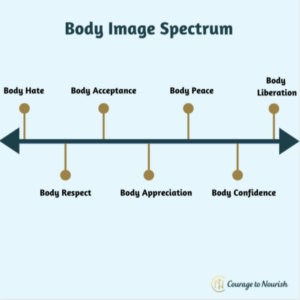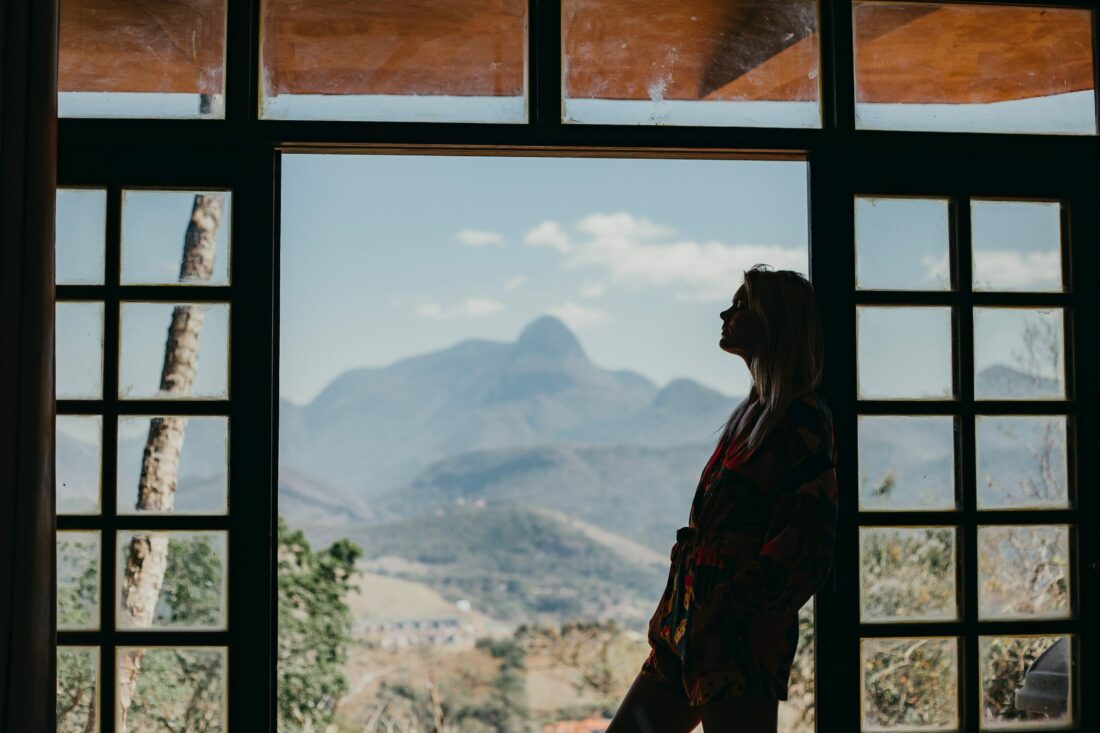I remember the most liberating phrase someone once shared with me about body image. So much so that it stopped me short and gave me a sense of relief. “Positive body image isn’t thinking about your body in a positive way all the time, it’s just thinking about your body less often.”
Let’s unpack this!
When we are less focused on the size, shape, or appearance of our bodies and more focused on living a fulfilling life, that’s a positive shift in body image. Furthermore, when our brain space is no longer consumed with thinking about our body size, that’s body liberation. We can find relief when we realize our bodies are far from the most interesting or important aspect of our personalities.
Unfortunately, many of us are all too familiar with the cycle of body guilt, shame, and judgement. We exist in a culture that sometimes equates worth based on body type. This is as sickening as it is true. Rather than denying sizeism, let’s consider if we want to opt into this value system that places body size on top. Here at Courage to Nourish, some of our favorite work to do with clients is exploring what it may look like to challenge body judgements along the journey to body acceptance.
Body Image Spectrum
Just like recovery, body image isn’t black and white, all or nothing, good or bad. Instead, think of it along a spectrum:

In recovery, we might find ourselves starting from a place of body hatred, disgust, frustration, or hurt. Similarly, there can often be anger, confusion, and sadness (among other emotions) as we acknowledge this strained relationship with our body. From body hatred, imagining body love and liberation can feel overwhelming and even laughable. So much so that it seems out of reach. And maybe that’s because it is – hear me out!
Body Love and Liberation
Some people resonate with the idea of body love or liberation and work towards this goal. Some folks exist in a space of truly loving their bodies. This is fabulous! However, maybe it’s not for everyone!
In recent years, the trend of body love has been presented as the alternative to poor body image. Corners of social media are filled with images of people proudly accepting and loudly loving their bodies. Ask yourself:
- Does this feel liberating, or does it leave you feeling unseen by the body love community?
- If I don’t want to hate my body but I can’t love my body, where do I fit?
While body love may have started out as a movement to help folks feel included and seen, sometimes it can feel so out of reach. So much so that it amplifies shame and leaves us feeling isolated.
Body Acceptance
Enter body acceptance! If we look at the body image spectrum, we see that any move away from body hatred brings us closer to body love. First, we need to move from judgement to curiosity. Ask yourself:
- What if, instead of hating our bodies, we could begin tolerating them?
This could look like reframing a thought from ‘I hate my stomach’ to ‘I don’t really like how my stomach looks right now and it makes me uncomfortable. I’m trying to sit with this.’ Notice how this subtle shift moves us away from hatred? It’s not outright acceptance. Rather, it is acknowledging the challenge of how you might currently feel living in your body. Tolerance is uncomfortable and exhausting. However, it moves us closer to both acceptance and love.
Next, perhaps we can expand our curiosity and begin to play around with the idea of body acceptance. For instance, a move from tolerance to acceptance may look something like this: ‘I’m having a hard time with my stomach today, and I know that I am trying to care for myself. This is the stomach I have and I want to be ok with it.’ Body acceptance is all about self compassion. For example, trusting yourself and your body, noting this is the body you are living in and you are doing your best to care for it.
Body acceptance may not have the glamor or the instagram appeal of body love. However, it’s a safe, comfortable, and nurturing space to create for yourself. Maybe body acceptance resonates with you as a personal goal? Perhaps it’s a stop along your journey to body liberation. Body image healing is about creating a healthy environment for your body. There is no one-size-fits-all body image.
Final Notes
If you are struggling with your relationship with your body and feeling uncertain about how to improve it, working with an eating disorder dietitian and/or therapist could be a helpful next step. In sessions with our clients we work to create a safe space to explore your relationship with your body. Courage to Nourage has offices in College Park, Maryland. Columbia, Maryland. And Alexandria, Virginia. We also see clients virtually across Virginia. Maryland. Washington DC. Colorado. And Pennsylvania. Reach out today for a free discovery call!

